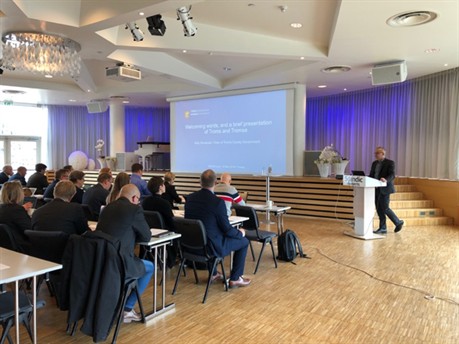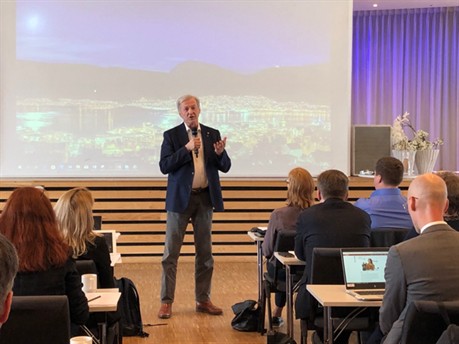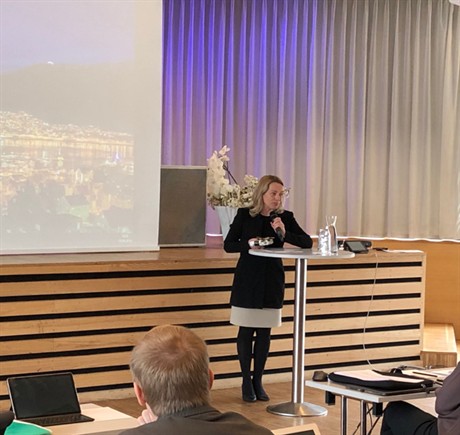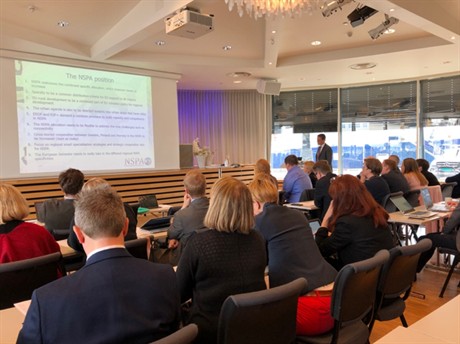NSPA Forum in Tromsø, Norge
Interesting topics on regional development in the Arctic that lie in front of the Northern Sparsely Populated Areas, NSPA, were discussed during this year’s NSPA forum in Tromsø, Norway. The future of regional funding from the EU budget, workforce mobility across borders, and an efficient tool to attract business investments, and more.

Willy Örnebakk, Regional council in Tromsö, welcomed everyone to the conference.
NSPA
Northern Sparsely Populated Areas, NSPA, is a network where 13 regions in northern Sweden, east north Finland and north Norway works closely together in order to represent interests from the regional European arctic and influence EU’s arctic policy. The Brussels offices North Sweden European Office, East & North Finland and North Norway works closely together on the EU arena in order to influence EU policy by putting forward regional perspectives on arctic issues. The NSPA forum is a yearly event taking place somewhere in the region.
Chair shift
Willy Örnebakk, Regional council in Tromsö, opened the conference by welcoming the participants. He spoke about the future cooperation of Northern Sparsely Populated Areas, NSPA, where he would like to see common solutions to strengthen business investments and the market in the region as well as attract competencies. Some of the NSPA common challenges are the sparely populated areas with great distances to the market as well as ongoing centralization trends. Willy pointed out how important the sectors of tourism, sea and lake culture and fishing is to Tromsö, where the population has grown in the past few years. Possibilities to further develop transportation such as airports and harbors are crucial for the region. Nils-Olov Lindfors, Regional council in Norrbotten, and new chair for the NSPA network, pointed out the positive cooperation, crucial to position the northern European areas on the international arena where many actors are fighting about the arctic. He highlighted the importance of reinvesting incomes from natural resources in the NSPA regions that today are cared for by the state.

Nils-Olov Lindfors, regional Council in Norrbotten Highlighted the positive cooperation with the NSPA Satu Vehreävesa, regional develoment director in Pohjois-Savo
Satu Vehreävesa, regional develoment director in Pohjois-Savo
The NSPA matters in the EU
Mikael Janson, Director of the North Sweden European Office, presented the coming discussions on the future long-term budget for 2021-2027 where NSPA has an interest. Important to NSPA is that the European commission suggest the future Interreg-program to be incorporated by a greater geographical area and that the boarder programs across water are being removed. The EU has listened to the NSPA´s need of money for competence development by putting some of the extra allocation within European Social Fund. Through NSPA, the regions have got the opportunity to use regional development funding for infrastructure and the development of broadband. Important for the NSPA in the next programing period will be to consider how to work when the EU´s cooperation program looks to be expanding its geographical areas but not for a single area around Östersjön. NSPA needs to look into the possibilities to work with Smart Villages and Regional Specificities with smart specialization across the borders, in order to build value chains together in the regions. NSPA also believes that EU´s urban agenda should address all regions within the EU, not only regions with large cities because all sparsely populated regions have cities.
 Mikael Janson, North Sweden
Mikael Janson, North Sweden
The EU´s arctic regions
Later on, it was discussed how NSPA has worked with the Arctic issues to put northern Sweden, Finland and Norway in the center of the EU discussion about the Arctic. This has played an important role for EU´s growing interest in the region and for a growing engagement in the Arctic including investments that ties the EU transport system through the Bothnian corridor though Sweden, Finland to northern Norway.
Nils Christian Nilsen, Director of North Norway European Office, who moderated the forum, led the discussion on how the work should continue after the OECD rapport as well as the arctic cooperation report that the NSPA helped create for the EU. The challenges that the OECD pointed out, are demographic with great distances for the market, lack of official infrastructure and services. The NSPA needs to grow their cross-border cooperation in the Sami culture (Sweden’s indigenous people) and business, improve the possibility for public services, develop infrastructure to increase smart specialization and import the prerequisites for the labor market.
Johannes Lith, project manager in Finnish Lapland, presented the Arctic Investment Platform, AIP. The goal of the study is to develop a support system and a roadmap for investments in the region. This is welcomed by NSPA as the regions need to attract foreign investors to increase the links between investors and existing micro companies and increase the knowledge of the actual supply and demand.
Great investment needs within the NSPA
The transport infrastructure issue is crucial to connect the Arctic region. Within that digital infrastructure it’s relevant for the NSPA to continue building datacenters and a digital e-society. Industries with smart specialization within sectors like biotech, tourism, ICT, mining industries, engineering are also important to support. The NSPA also has to consider how do develop education possibilities, competence growth and inclusivity for migrants.
In coming panel discussion, the issue on better knowledge on micro companies within the NSPA was raised, in order to have information for investors where to go at the start of an Interreg project. The NSPA should increase cross boarder cooperation between companies. At this point there are platforms for regional development but what is needed is a platform to make business where business and research meet. One idea concerning connecting companies and regional projects is to start a forum with only regional companies and a clear agenda with focus on expansive and cross boarder cooperation.
The next step for the NSPA
In the closing discussions on the NSPA´s next steps several ideas were put forward: The NSPA should establish a coordinated civil servant group on the home arena. A digital cluster map that all actors in the NSPA can use with the purpose of highlighting micro companies and small clusters, so that actors can find each other. To promote cooperation between actors from the Universities within parts of the NSPA, the so-called Arctic Five, as a potential enabling platform.
The next NSPA-forum will take place in northern Sweden in Västerbotten.
Learn more about the NSPA on the website
Learn more about the Arctic investment platform
Learn more about the project Arctic labour
/Julia Hanson
